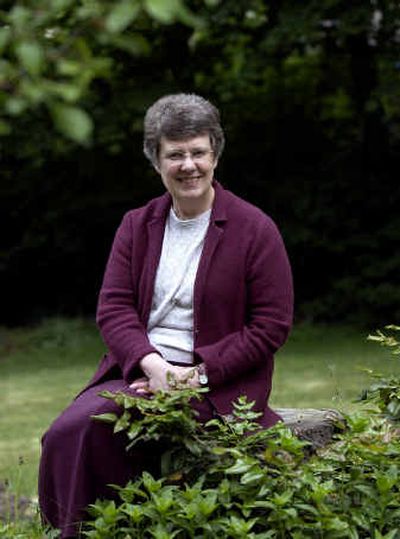faith in the news

These are stories of “faith in action” — a church leader who uses her theater skills for pastoral work; a woman who started a shoes-and-socks ministry for the poor; high school students who volunteer at the food bank.
Long before religion became “news” to many media organizations, a small Spokane publication was already dealing with issues of faith and culture by showing how people’s beliefs motivate their actions and impact their lives.
For the past 20 years, The Fig Tree has been a voice for numerous religious ministries, social justice groups, volunteer organizations and thousands of individuals whose quiet efforts have made a difference both locally and throughout the world. While churches and religious institutions have always printed out newsletters and other publications about what’s happening in their communities, The Fig Tree is the sole publication in the Inland Northwest that strives to write about all Christian denominations and other faith groups. Since its inception, the monthly newspaper has sought to connect people and empower readers by publishing stories of “ordinary people doing extraordinary things,” said editor Mary Stamp.
“Our goal is to show people live the excitement of their faith so they can encourage one another,” she said.
On Thursday and Friday, The Fig Tree will celebrate its 20th anniversary during four events that feature the Rev. Bob Edgar of the National Council of Churches. Following its mission of promoting communication among the area’s faith communities, the newspaper will bring Edgar together with local leaders to discuss a number of topics, including overcoming poverty and celebrating diversity.
The Fig Tree became a reality two decades ago after the Interfaith Council — known as the Spokane Christian Coalition at the time — approached Stamp about starting a publication. Stamp, whose previous experience included publishing InterChurch, an ecumenical newspaper in Fresno, Calif., immediately got to work despite the lack of funding.
She came up with the newspaper’s name from the image of the fig tree in Micah 4:4. “It’s an image of people living in peace and justice and wholeness,” Stamp said.
Together with Sister Bernadine Casey, a Holy Names sister, Stamp solicited ads, wrote articles and laid out an eight-page newspaper that featured numerous articles: how the annual CROP Walk raised $30,000; a pastor in Rosalia, Wash., who played harmonica to enrich liturgy; lay people involved in pastoral care; a Spokane gathering that intertwined Native American traditions with Catholicism.
From the very beginning, Stamp and Casey assembled a small, religiously diverse volunteer staff to interview people and write human-interest stories that don’t always make TV news or the pages of secular newspapers, including The Spokesman-Review. When The Fig Tree made its debut, religion news wasn’t covered much by the media, said Stamp.
Today, The Fig Tree’s circulation has grown from 3,000 to 8,000. Its gross income, which averaged only $23,000 during the first 10 years, has nearly tripled to $60,000. Every month, churches and individuals from throughout Central and Eastern Washington and North Idaho receive copies of the newspaper in the mail. Casey, the newspaper’s associate editor, recalls a time when they had to scramble to get businesses to place ads. Now, The Fig Tree not only has enough name recognition in the community, she said, people are actually calling to advertise. It also is in the process of launching an interactive Web site that will include photographs, articles and video and audio coverage of interviews.
“It has truly been a labor of love,” said Stamp, looking back at the last two decades.
A native of Rochester, N.Y., who grew up in Eugene, Ore., Stamp was raised by a Methodist father and an Episcopalian mother who both joined the United Church of Christ. Her parents cared deeply about human rights and social justice, and inevitably influenced their daughter to follow their example.
Stamp, 59, earned a journalism degree from the University of Oregon and spent many years writing freelance articles while raising three young children. Drawn to human-interest stories, Stamp’s perspective on newsgathering was significantly influenced by her experience at the World Council of Churches’ Ecumenical Institute in Switzerland, where she audited the graduate studies program in 1969. During that time, she lived in a community of 60 people from various faiths hailing from 40 different countries. From those relationships, she discovered how much culture, language, faith and tradition influence and define human beings.
As a freelance writer, she was disappointed by the way mainstream media took a “trendy, faddist” approach to news coverage, she said. That’s what motivated her to publish InterChurch in Fresno and eventually led to her start The Fig Tree.
Since its inception, many in the Inland Northwest have praised Stamp’s publication for its efforts at ecumenism and for publishing stories about people who make a difference.
When Kateri Caron, director of the Interfaith Council, moved to Spokane five years ago, people told her to pick up The Fig Tree to get a pulse on the area’s faith communities, she said.
“It surprises us with delightful things,” Caron said, noting how she often hears from pastors and lay people about how encouraged they feel whenever they read the publication. “It reaches across boundaries and we hear about people we wouldn’t normally hear about.”
Those who have worked at the newspaper have also found their lives transformed, said Deidre Jacobson, who started writing for The Fig Tree 1 1/2 years ago. “My life is blessed by the experience of talking to people in our community who are doing miraculous things,” said Jacobson.
For Stamp, the newspaper has opened many doors, leading her to form relationships with sources that have influenced her own life and faith journey.
“I believe God speaks to people in different ways,” she said. “And I have the joy of listening to their stories.”